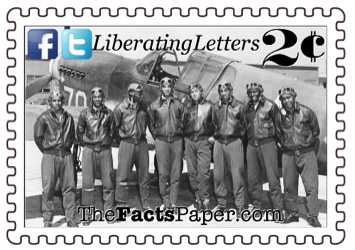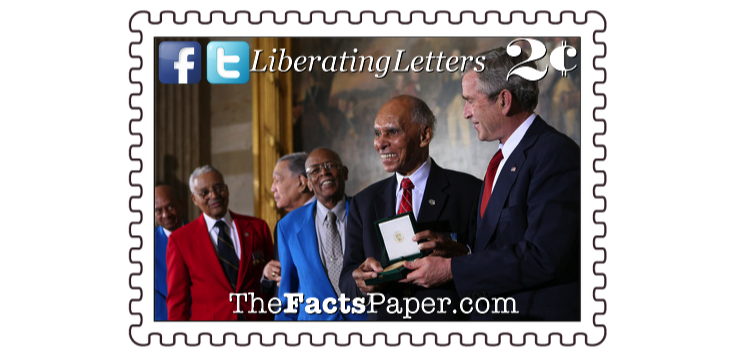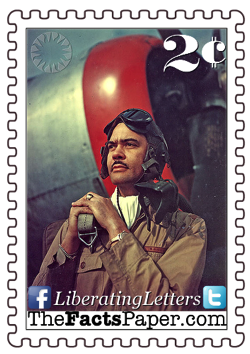By the end of World War II, Tuskegee trained 992 African American pilots, with 355 seeing combat. In addition, over 16,000 ground crewmen received instruction. The Tuskegee Airmen had an exemplary record of protecting bombers, flying a total of 1,578 combat missions and 179 bomber escort missions. In addition to downing 112 enemy airplanes, they destroyed over 1,o00 enemy aircraft, trucks, rail cars, and other vehicles on the ground. Their reputation skyrocketed when a 1945 article in Liberty Magazine by Roi Ottley stated the Tuskegee Airmen never lost a bomber they escorted. The claim remained a widely accepted fact for decades, but was eventually corrected as historians discovered at least two dozen American aircraft escorted by the Tuskegee Airmen were shot down. Regardless, their record was still extraordinary and notable as white units averaged 46 lost bombers.
For their performance in World War II, the Tuskegee Airmen were awarded 3 Distinguished Unit Citations (DUC), multiple Silver Stars, 150 Distinguished Flying Cross Medals, 14 Bronze Stars, 744 Air Medals, and roughly 60 Purple Hearts. Sadly, 84 Tuskegee pilots lost their lives, 68 of which occurred during combat. Following the war, it was evident from the Tuskegee Airmen that African American pilots were equal to their white counterparts. Therefore, in 1948 Democrat President Harry S. Truman issued an Executive Order, drafted with the help of Colonel Davis, desegregating America's military. On March 29, 2007, 62 years after the end of the war, Republican President George W. Bush awarded more than 300 of the original Tuskegee Airmen in attendance the Congressional Gold Medal.
Liberty, all of the Tuskegee Airmen fought against tremendous odds and prejudice to get their chance to prove themselves. In the end, they demonstrated to America and the world they were equal to the white man, earning the respect and opportunities they deserved. Unfortunately, Affirmative Action Executive Orders and laws of the 1960’s required businesses and organizations to hire certain amounts of minorities. While the goal was to curb discrimination, they actually robbed many minorities of the chance to do what Davis and the Tuskegee Airmen did, illustrate to themselves and everyone else just what they can do. No longer are people judged by the content of their character, but by the color of their skin. Knowing race, and now gender, will give them an advantage, many people are perfectly happy exerting the bare minimum needed while acquiring all the benefits they can.
The Tuskegee Airmen men loved their country, flaws and all. They didn’t want to destroy America because of her past mistakes. They wanted to make America better by correcting those mistakes, making her better for future generations.
Liberty, you are inheriting a world where conservatives and Christians are the new victims of intolerance. They are silenced on social media, degraded by liberal news outlets and Hollywood, and discriminated against in workplaces and government positions. But you can make a difference. You can stand for your principles and prove to America and the world that you and those like you are worthy, exposing their bigotry and narrow-mindedness. Then one day, the President of the United States can say that you are “proof that a person can overcome adversity and discrimination, achieve great things, turn skeptics into believers; and through example and perseverance, one person can bring truly amazing change.”
That’s my 2 cents.
Love,
Mom
March 19, 2019
Dear Liberty,
At the funeral of General Benjamin O. Davis on July 17, 2002, Democrat President Bill Clinton stated, "General Davis is here today as proof that a person can overcome adversity and discrimination, achieve great things, turn skeptics into believers; and through example and perseverance, one person can bring truly amazing change.” Yet, he was not alone on that journey, and the quest is far from over.
Republicans in the Reconstruction Era broke down numerous segregation barriers, only to have Democrats rebuild them once they returned to power. (see Civil Rights...And Wrongs) Progressive Democrat President Woodrow Wilson, the first Southern president since the Civil War, set race relations back to pre-Civil War levels by segregating Federal offices and departments, including the military. Regardless, blacks refused to play victim and relentlessly demonstrated their equality.
While in office, Wilson helped promote the Southern ideology of African inferiority through his support of the movie The Birth Of A Nation, a pro-KKK movie which quotes his own book, History of the American People. (see The Birth of a Nation) Thanks to the movie, racist ideology began to infest the government and the country, causing blacks to again be viewed as sub-human. Whites in the military insisted blacks were not capable of such positions as officers and pilots, even though blacks had fought for America alongside whites since the Revolutionary War.
As Paul Revere raced towards Lexington to warn “The British are coming,” Wentworth Cheswell, a prominent free black man, guided his horse northward. In one of his many patriotic acts, he rallied the militia that confronted the Red Coats retreating from Lexington and Concord. (see The Forgotten Black Founding Father) Black slave James Armistead requested to fight with the Marquis de Lafayette, who sent James behind enemy lines as a spy. (see The Forgotten Hero) In this role, James provided the essential information George Washington and Lafayette needed to attack and defeat General Charles Cornwallis at Yorktown. (see On A Mislead And A Prayer)
The first black United States Senator, Hiram Rhodes Revels, recruited blacks to fight in the Civil War, as well as joining himself as a chaplain. (see The Forgotten Senator and Doing Our Duty) When Robert Smalls escaped during the Civil War, he took a Confederate ship with him, which he turned over to the Union stating, “I thought the Planter might be of some use to Uncle Abe.” He enlisted in the U.S. Navy, eventually becoming the first black man to command a U.S. ship. (see From House Slave To House Of Representatives)
During World War I, Wilson refused to acknowledge the validity of the black soldier, which infuriated General John "Black Jack" Pershing. (see The Forgotten General) As commander of the first black calvary unit, the “Buffalo Soldiers”, Pershing understood the importance of black soldiers, who were pivotal in taking San Juan Hill with Teddy Roosevelt and his Rough Riders. (see A Tale Of Two Soldiers) Wilson’s own white superiority greatly hindered the effectiveness of black soldiers during the “Great War” as they were only allowed in infantry units, often placed with Allied forces, and were barred completely from flying.
With Hitler’s rise to power, another war approached. Therefore, Congress created the Civilian Pilot Training Program in 1939, which involved several historically black colleges. However, the U.S. Army Air Corps (precursor to the U.S. Army Air Force, USAAF June 1941, and U.S. Air Force, USAF 1947) continued their ban. During the 1940 presidential election, Republican nominee Wendell Willkie included in his platform the promise to desegregate the military. The democrats had begun to sway black voters to their party by offering incentives to vote for their politicians. In efforts to keep the black vote, Roosevelt made the strategic action of approving the enlistment of black pilots into the Air Corps in September, just before the election. Black pilots rejoiced on January 16, 1941, as the government announced that aviators would be trained at Booker T. Washington's Tuskegee Institute where the civilian program was already implemented and an Army airfield was under construction. (see A Tale Of Two Leaders)
The first black unit of the Army Air Corp, the 99th Pursuit Squadron, was activated on March 19, 1941. A month later, First Lady Eleanor Roosevelt visited the airfield, taking a flight with the chief flight instructor, Charles "Chief" Anderson. Publicity photos and film from the event helped garner support for the "Tuskegee Experiment" throughout the nation, with the first class of 13 starting in July.
Five airmen graduated in the first Tuskegee class on March 7, which included Captain Benjamin O. Davis Jr., a West Point graduate and military science and tactics instructor at the institute. He was also the son of the first black army general, Benjamin O. Davis Sr. (See Like Father, Like Son) Promoted to lieutenant colonel, Davis Jr. received the command of the 99th, known as the "Tuskegee Airmen", taking them to Allie controlled North Africa.
PROOF POSITIVE



The following month, Davis rejoined the 99th with the all black 100th, 301st and 302nd fighter squadrons. Together, they comprised the new 332nd Fighter Group. Shortly after, the Tuskegee Airmen began flying P-51 Mustangs, which sported a red tail. As a result, they received the nickname "Red Tails" or "Red Tail Angels” as they escorted and protected bombers conducting raids deep within enemy territory.
As more pilots and aircrew men were trained, plans developed to form a larger all-black unit. Also assigned to the unit were black flight surgeons, another first in U.S. military history. The USAAF called Davis back to the states in September 1943 to command the new group that would be heading overseas soon. However, despite successful missions and accomplishments of the 99th, several senior officers in the USAAF continued to subscribe to the idea of black inferiority. They accused the 99th of poor performance, requesting they be removed from combat. Without hesitation, Davis defended his old unit, holding a press conference at the Pentagon. Next, he visited a War Department committee studying the effectiveness of black servicemen where he argued his case. As an inquiry proceeded, General George Marshall allowed the 99th to continue fighting. The investigation confirmed black fighter pilots performed equally to white ones, but all critics were silenced when the 99th shot down twelve German fighters in January of 1944 at Anzio beachhead in Italy.



